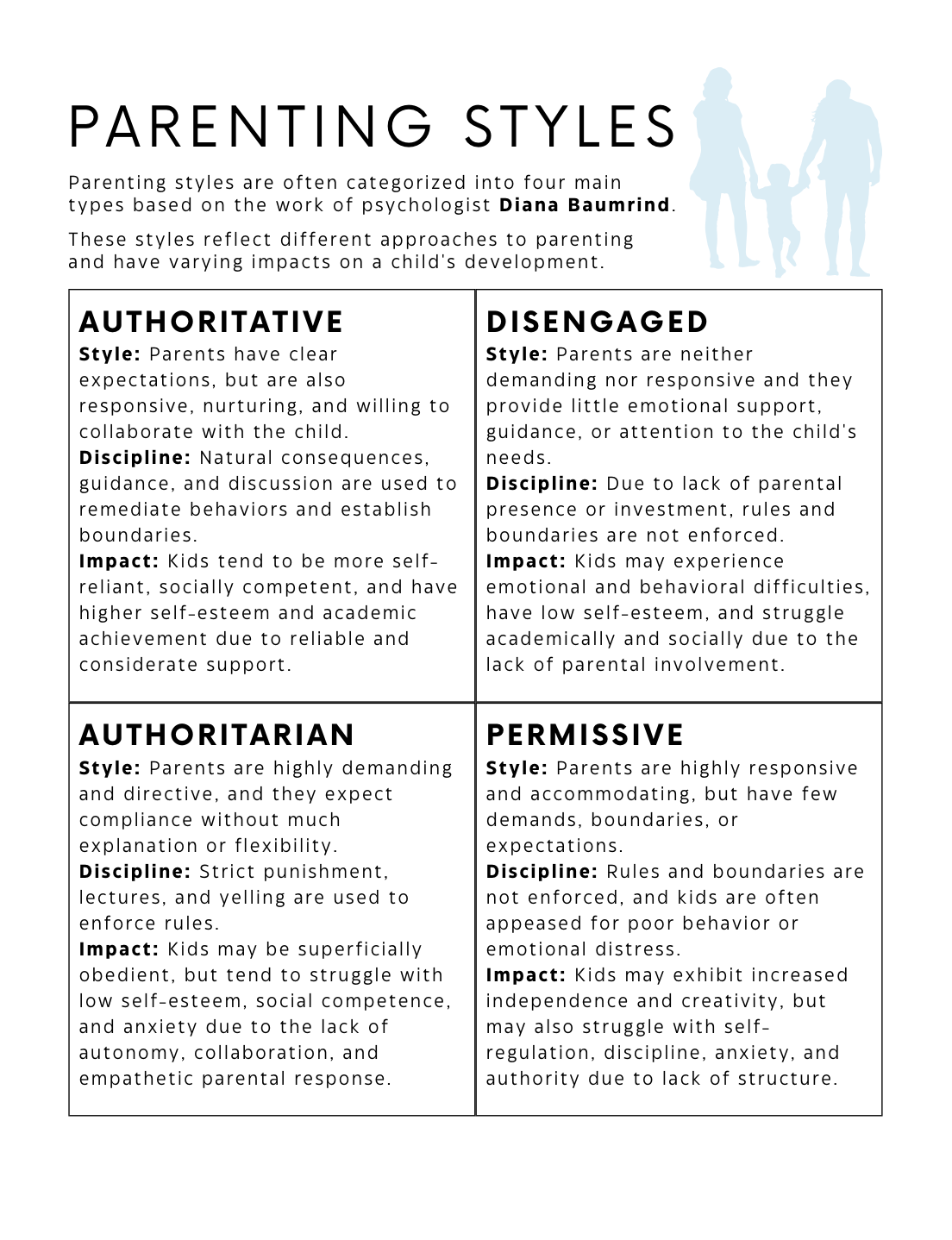Parenting Styles: Explained
Authoritative ● AuthorItarian ● Permissive ● Disengaged
Parenting styles are often categorized into four main types based on the work of psychologist Diana Baumrind: authoritative, authoritarian, permissive, and disengaged.
These styles reflect different approaches to parenting and have varying impacts on a child's development.
Authoritative Parenting
Parents who practice authoritative parenting have clear expectations of their children, but are also responsive, nurturing, and willing to collaborate to meet individual needs. Instead of strict punishment, authoritative parents use natural consequences, guidance, and discussion to remediate behaviors and establish boundaries. Research supports the efficacy of authoritative parenting and it is touted as the ideal parenting style for good reason. With parental confidence, flexibility, reliability, and consideration, kids tend to be more self-reliant, socially competent, and have higher self-esteem and academic achievement.
Authoritarian Parenting
Parents who practice authoritarian parenting are highly demanding and directive. They have strict expectations and require compliance without much explanation or flexibility. Punishment, lectures, and raised voices are often used to enforce rules. Parents may be encouraged by superficial obedience (obedience to avoid punishment), but their kids tend to struggle with low self-esteem, social competence, anxiety, and decision-making abilities due to the lack of autonomy, collaboration, and empathetic parental response.
Permissive Parenting
Parents who practice permissive parenting are highly responsive and accommodating to their children, but have few demands or expectations. Rules and boundaries are not enforced, and kids are often appeased for poor behavior or emotional distress which can lead to the unintentional reinforcement of maladaptive behaviors. Kids may exhibit increased independence and creativity under this parenting style, but they also tend to struggle with self-regulation, discipline, anxiety, and authority due to lack of structure.
Disengaged Parenting
Parents who practice disengaged parenting are neither demanding nor responsive, and they provide little to no emotional support, guidance, or attention to the child's needs. Due to lack of parental presence or investment in the child’s life, rules and boundaries are not enforced. Under this parenting style, kids may experience emotional and behavioral difficulties, have low self-esteem, and struggle academically and socially due to the lack of parental involvement.
Have I been doing it wrong?
Realistically, most parents have exercised all four parenting styles at some point. Is my kid damaged because I bought them a cake pop to pacify a meltdown? No.
There is no one-size-fits-all for parenting and no parent can maintain perfect composure at all times. However, research supports the benefits of authoritative parenting for healthy outcomes in all areas: social, emotional, behavioral, and academic. Authoritative parenting also allows for a trusting, positive, and fulfilling parent-child relationship. Parenting is always going to be “work,” but the authoritative parent reaps the rewards of confident and compassionate authority: enjoyment.
Like most things, parenting exists on a continuum. To become a healthy authority figure, allow your parenting style to evolve as you and your child learn and grow. If you are usually authoritarian, consider engaging your child in respectful discussion rather than lecture. If you are usually permissive, initiate a collaborative approach to a situation rather than conceding to your child’s impulses. If you are usually disengaged, show interest in your child’s life (conversation starters can help!).
Considerations
Reflect on how you were parented. For better or for worse, are you adopting the style that was modeled for you, or are you compensating by using a style that opposes the way you were raised?
For many parents their parenting style is also influenced by anxiety. The authoritarian parent might worry that their child will be undisciplined or lazy if they don’t firmly direct them. The permissive parent might worry that their child will tantrum or have low self-esteem if they set boundaries. The neglectful parent may be struggling with personal complexities that prevent them from being available to their child.
Meet yourself with empathy and allow your individual parenting style to bloom.
A free printable version of this information is available in our Infographics Tab!
CLICK HERE to explore our pediatric mental and behavioral health infographics.



